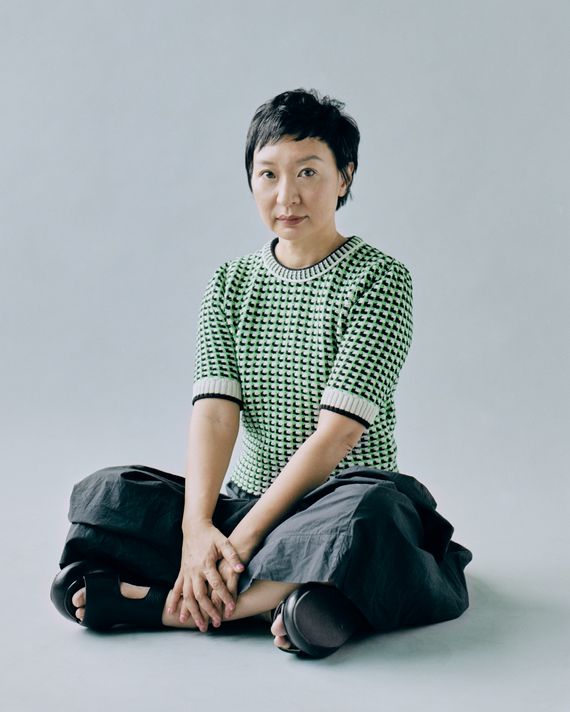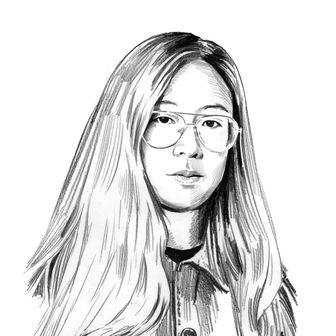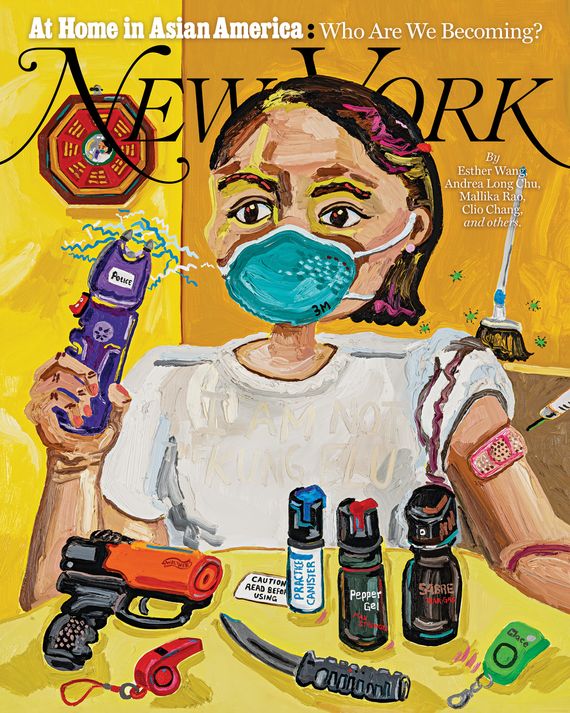
Here is a sample of the questions Cathy Park Hong has been asked in the past two years. Asian people want to know what they should do when they are microaggressed: “What should I say to someone who says, ‘Where do you come from?’ ” White people ask her how to be a better ally: “What do I do if I witness a microaggression against one of my co-workers who is Asian American?” Podcast hosts ask her what it means for Asian history to be erased in America. Once, when she was giving a talk in South Korea, a college student came up to the mic during the Q&A. “My mother is super-toxic,” the student told Hong. “I don’t know how to make her understand my identity as a queer person. What do you think I should do?”
Hong, who is 46, is a poet by trade. Since 2002, she has published three collections themed around empire, civilizations, and invented languages, which have earned her a small, dedicated fandom in the world of avant-garde poetry. But in 2020, her career changed radically with the release of Minor Feelings: An Asian American Reckoning, a collection of essays that explore her experience as a Korean American and a poet. The book, Hong said, was an attempt to “articulate Asian American interiority” as well as a broader effort to recast and refine conversations about Asian Americanness. In one essay, about her relationships with other Asian women, Hong tries to show Asian friendships that are messy and flawed, while another, about the rape and murder of poet Theresa Hak Kyung Cha, becomes an exploration of the erasure of Asian American women artists. The book’s title was borrowed from the cultural theorist Sianne Ngai’s “ugly feelings”; in Hong’s essay about stand-up comedian Richard Pryor, she defines “minor feelings” as “the racialized range of emotions that are negative, dysphoric, and therefore untelegenic.” The collection came out four days before the first case of COVID-19 was confirmed in New York. Hong’s planned tour went to Zoom, and she anticipated that her book would get buried like so many others.
Earlier that month, New York City had seen its first reports of anti-Asian violence brought on by COVID; in one instance, a masked Asian woman was allegedly attacked and called “diseased” on the subway. Donald Trump soon began tweeting about the “Chinese Virus.” In the ensuing months, Asian Americans reported being spat on and screamed at by strangers; the hashtag #StopAsianHate took off, and anti-Asian racism became visible in a way it never had before. Minor Feelings had been on track to have a normal release, but — through a combination of some acclamatory reviews, word of mouth, and pure timing — it was perfectly positioned to meet the moment.
“It’s a book that is angry about all the things we should be angry about. The affect fit,” said Min Hyoung Song, the director of the Asian American Studies program at Boston College. Universities and publications put the book on their anti-Asian-racism resource lists. (“Self-education is a great first step to combat internalized and institutionalized anti-Asian paradigms,” starts a Bustle reading list on which Minor Feelings is No. 1. “And infinitely better than placing the responsibility on an Asian friend to educate you.”) It made its way into Good Morning America’s book club, the New York Times best-seller list, and the Pulitzer-finalists list. At a vigil against anti-Asian hate this past spring, an Asian woman held up a sign with a passage from Hong’s book (“For as long as I could remember, I have struggled to prove myself into existence,” the quotation began). The book was especially resonant for a certain professional, liberal-leaning, educated class of young Asians, from MIT students who reviewed it in their school paper, to data scientists tweeting their love for it, to the comedian Ali Wong, who wrote that reading it “felt like I was being shaken awake to something I had convinced myself wasn’t real.” When celebrity chef Alison Roman was asked on Ziwe’s Instagram Live show to list five Asian people, Hong was one of two writers she named. And in the spring of 2020, the actor Greta Lee messaged Hong over Instagram because she was interested in optioning her book and playing Hong for an A24 television series. “She thought she had to beat out all this other competition,” Hong told me. “I was like, ‘There’s no competition. It’s a book of essays.’ ” Minor Feelings is now in its 19th print run with 175,000 copies in circulation. Two years after its publication, it has become COVID canon.
At the time, there were a handful of prominent Asian American writers but no one who served the function of a catchall spokesperson for the idea of Asian America. Hong found herself being asked to give talks at museums, corporations, high schools, and psychoanalytic institutes, often from the perspective not of a writer but of an anti-racist public intellectual. There were invitations to speak on national anti-racist campaigns, to weigh in on mental-health issues facing the Asian American community, to talk to aspiring biochemists about structural racism in STEM. In 2021, she was featured on the cover of Time magazine as one of the 100 most influential people in the world.
“I was like, What? I’m not even one of the most influential people in Carroll Gardens,” Hong told me this past summer. “It felt like it was happening to an avatar, another person named Cathy Park Hong.”
For the past ten years, Hong lived in a two-bedroom apartment in the Gowanus neighborhood of Brooklyn, which she moved out of over the summer. On an afternoon in June, I met her there. The living room was meticulously clean for a household with a 7-year-old child. She spoke with muted intensity; when I asked her a question, she looked directly at me the entire time before responding, and it’s clear she was paying attention — to not only every word of our conversation but also the underlying syntax and grammar. (“Is that the right metaphor?” she murmured to herself after answering one of my questions.)
Hong was born in L.A.’s Koreatown; her parents had immigrated to the U.S. from Korea in the wake of the Hart-Celler Act. Her father, who runs a successful business distributing dry-cleaning supplies, made enough to send her to Oberlin to study English, and eventually, Hong got her M.F.A. in poetry at the Iowa Writers’ Workshop. She now teaches creative writing at Rutgers. Her work dealt broadly with colonization and globalization (“One Chinaman gets knifed fer being what he is / Another strikes it rich and apes us,” a line in Engine Empire reads), but when Trump was elected, Hong realized that she wanted to find a way to focus on the Asian American condition specifically, which she felt was missing from the racial discourse. For several years, she had been watching Pryor’s stand-up and was inspired by his “brutal honesty and vulnerability” about his racialized experience. Chris Jackson, the publisher of One World, said that when Hong first came to him and her then-editor Victory Matsui with the idea for Minor Feelings, she brought up the inspiration of another book One World had published: Ta-Nehisi Coates’s Between the World and Me. (When I ask Hong about this, she wants to make clear to me that she wasn’t trying to emulate Coates. “I deeply admire him,” Hong said. “I don’t really see my book as a parallel.”)
Originally, she explained, she didn’t even want the subtitle for her book — An Asian American Reckoning — but her editor suggested it. She told me that she now likes what they ended up with because it could be read two ways. “Asian American is a modifier, so it’s a reckoning that’s Asian American,” she said. “But you could also read Asian American as a noun. An Asian American — me — doing some reckoning. You know?” The subtitle, one could also imagine, likely helped to sell more copies.
When she began drafting what would become Minor Feelings, Hong imagined her audience as primarily artists of color; the first essay she wrote was “An Education,” which explores her friendships with two other Asian women during her time at school. Then her circle of readers widened slightly to “Asian Americans, men and women, who have had experiences similar to mine but haven’t found a narrative that captures that,” Hong said. “Then I thought, but the book is also for the Asian Americans who are totally not woke and need to be woke. Then it was for Black and Latinx people to highlight where our struggles were similar. Then I thought, it’s also for white people and for them to understand. But it was never written with white people in mind, to educate white people.”
Some sections of Minor Feelings speak to a more general audience — calls to imitate Yuri Kochiyama’s coalitional activism in the 1960s, passages about the racism of the 2017 ejection of David Dao from a United flight — but Hong said she never meant for the book to serve as an anti-racist primer. “I never had any goals to be a public intellectual. It’s not a position that I feel natural or comfortable in,” Hong was careful to emphasize. “However, especially because of everything that’s been happening in the last two years, I also feel like it’s my responsibility to speak out.”
During the early days of the pandemic, after the release of Minor Feelings, Hong was stuck at home. She’d write fragments of poems to try to arrest the passing hours but often found herself, like so many others, scrolling on social media. She began tweeting about the pandemic. One of the first causes she took up was to critique the way mainstream media was reporting on anti-Asian racism. In earnest tweets, she called out journalists for a lull in covering acts of violence against Asian people, “leading us to believe that it’s subsided but it HAS GONE UP,” she wrote in August. That April, she had written an op-ed in the New York Times about the early-pandemic hate crimes (“I am enraged. I am scared. In addition to fears of catching the virus or of being unemployed or of loved ones dying, we now have to worry about having acid thrown at us?”). She went on Ibram X. Kendi’s podcast to talk about interracial solidarity. During Asian/Pacific American Heritage Month, more requests rolled in. Sometimes she said “yes,” but she’d also sometimes say “no,” like when a flood of cable-news channels called her up immediately after the massacre in Atlanta.
The pundit’s seat, of course, comes with its own set of expectations. On Twitter, she would often reveal a predilection toward speaking out on some of the other Greatest Hits of Asian American Racism—the “perpetual foreigner” stereotype, representation in Hollywood — which in turn invited eye rolls from young left-leaning Asians who were more concerned with addressing material inequalities. In May 2021, Hong tweeted, “Sigh: I don’t want Andrew Yang as my mayor and will likely vote for Maya Wiley. But can we stop with the ‘Andrew Yang is not a real New Yorker’? That just hits a little too close to ‘Asians are not real Americans’ kinda thinking okay?” A few months later: “rewatched Christmas Story this weekend with 7 year old and was relieved that asians were not the punchline until — surprise!! — the last scene. Like what Hollywood film before 2019 has NOT been anti-Asian?”
I asked Hong why she felt compelled to step into a more public role at all, despite her repeated assertions that it didn’t come naturally to her. (She is even hesitant to acknowledge it, then backtracks: “My default mode is to be self-deprecating always, but I’m really trying not to do that,” Hong said. “I don’t think it’s a good model for other young Asians.”) She told me that early in the pandemic, she felt concerned about the rise of hate crimes against Asian Americans and the ways in which the reporting on the topic felt anonymous. As a writer, Hong felt she could “bring blood and feelings and emotions and intellect” into what was happening. “But if you’re a little bit public, people are going to make a representative out of you no matter what,” she conceded. “It’s not just white people. People from your own community are hungry for visibility.”
Asian America, whatever that might mean, is in a rapid state of transition. The term burst onto the political scene in the ’60s as part of the Third World Liberation Front, then lay dormant for decades as it became a demographic box to tick off. Now, suddenly, it feels as if the conversation around Asian American race and identity is making up for lost time. Rereading Minor Feelings only two years after its debut, it can seem as though the discourse has already outpaced parts of the book in expected and unexpected ways. Much of the collection, for example, centers on the imperative need for Asian Americans to be visible — as Hong writes, “When I hear the phrase ‘Asians are next in line to be white,’ I replace the word ‘white’ with ‘disappear.’ ” Yet now we’re seeing Asians thrust into a state of hypervisibility; the danger is less that we won’t be seen and more how those in power will abuse our new visibility. There are moments in Minor Feelings, too, that feel of a very specific time or ethos, such as when Hong talks about Asian self-hatred, which even she acknowledges in the book may be “on its way out with my generation.” (As the critic Jia Tolentino wrote in a review at the time it came out: “I hate my Asian self the way I worry about being written off as a woman writer — which is to say, not at all.”)
Hong herself said that, looking back, she might have focused the book more on the history of Black-Asian conflict and the colonial history of Asian female sexuality. Overall, “I think my essential thinking about Asians is still the same,” she said. “I think I’ve said all that I have.” Now, Hong said, she’s deep in her next projects, a book of poetry and a “nonfiction-fiction” book, which has made her more protective of her creative time. She has a much wider readership, and her status as a writer has transformed over the past two years. She’s glad it has made other Asians feel less isolated. But she’s still grappling with the territory.
“Younger people expect me to be a therapist, or a diversity coach, or a political organizer, or a poli-scientist, or an urban planner,” Hong said. “And I have to constantly tell them that I am none of those things.”



